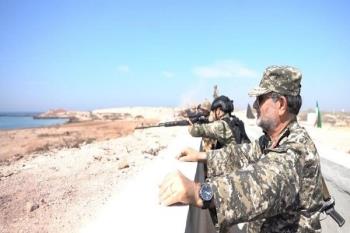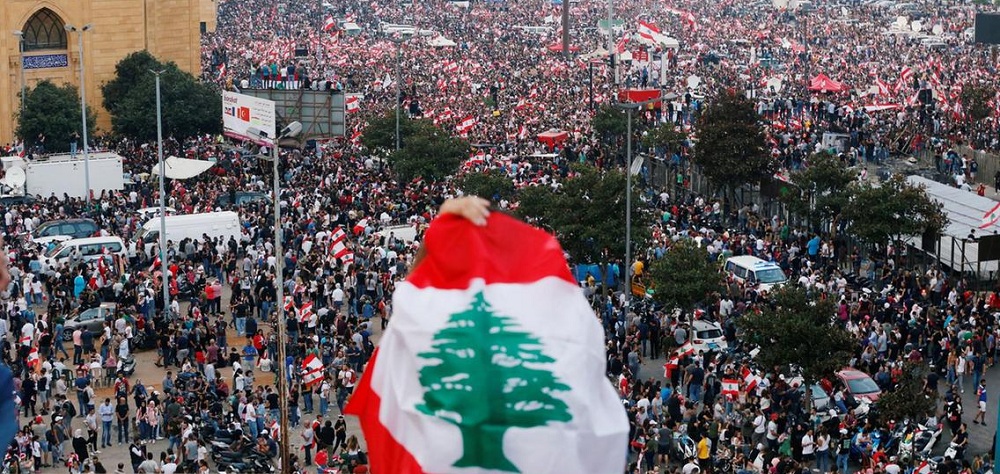Alwaght- On Monday, the Lebanese Prime Minister Saad Hariri unveiled an economic reform package to improve the living conditions in reaction to the demands of the protestors who over the past week rose against hard economic situation and corruption. He said the package won the agreement of the majority of his cabinet. Upon the eruption of the demonstrations last week, he issued an ultimatum to the parties sharing power in his coalition government to offer solutions. He also threatened that if they oppose his reform plans he will take “important steps”. One of the important steps, observers agree, is resignation from his post.
A cabinet official, who talked to the AFP on the condition of anonymity, said that the head of the government sent the package to all of the parties and received their positive feedback, especially from the Free Patriotic Union (FPU), a significant Christian actor in the country’s politics and led by President Michael Aoun, and Hezbollah, another heavyweight on the political stage. The two are key partners to the coalition government and main opponents of resignation.
According to a report by Reuters news agency, the economic reform plan suggests 50 percent cutting in the president, the PM, and the lawmakers’ salaries. The pay cuts also extend to the former presidents and top political officials who according to the law are paid after their job ends or they retire.
Moreover, Hariri eyes cutting the budget deficit through borrowing $3.3 billion from the central bank and other Lebanese banks, privatizing the communications sector, and renovating the power production and distribution.
Other steps include canceling increase of value-added Tax (VAT), the communication costs, and public services prices. He will also withdraw a suggestion to the parliament to cut the pays and benefits of government employees and vowed to pay housing loans to poor families.
The package demands that the government budget should not see any more deficit for 2020, as it wants to increase income tax for banks and insurance companies up to 25 percent. It also seeks privatization of the mobile communication of the country.
This package has a top point to pass to the Lebanese citizens: It does not intend to increase the taxes. It mainly targets the privatization of parts of the economy.
World Bank says over one-fourths of the Lebanese citizens are living under the poverty line, as the whole of the population suffers from a crisis in water and power industry and poor public services. The public fury began to simmer when in July the government passed an austerity-affected budget to get $11 billion in foreign loans.
Hariri also tried to strip the political elites of their political and financial benefits in a struggle to ditch the budget crisis. According to the country’s finance ministry, Lebanon ranks among the most indebted states of the world. Its foreign debts reach $86 billion, accounting for 150 percent of the gross domestic product (GDP).
The reform plan also puts in place an obligation on the banks to reveal to the government the banking info of all of the ministers, lawmakers, and other top job holders in the government. That is beside pushing for a parliamentary bill allowing for fighting corruption and seizing illegal income.
Lebanon ranks 138 out of 180 in the global rates of international financial transparency.
But contrary to PM’s expectation for a calm, the protests last night responded negatively to his invitation to quit the streets. They rejected his package and called for him to step down.
It should be seen why despite the PM’s efforts and the help from the major parties in the coalition government, the protestors stayed firm on their demand for the PM resignation and even they tended to violence after his Monday speech.
One of the main figures encouraging people to stay in the streets is Samir Geagea, the pro-US politician and leader of the Lebanese Forces party. He removed his ministers from the cabinet to topple the government.
Geagea, who also holds close links to Saudi Arabia, was the Saudi option for the 2014 presidential election after Michel Suleman’s term ended. He is an opponent to Hezbollah, widely known as “Resistance” in the country and the region, for its pro-independence, anti-Western intervention. He had promised that if he becomes president, he will be tough on the anti-Israeli movement and will force Hezbollah to lay down arms and quit Syria.
Picking Aoun as president, who is a Hezbollah ally, and winning the 2018 parliamentary election by the two represented to heavy losses to Saudi Arabia as an influential player acting against Hezbollah and its allies.
Saudi Arabia has been unhappy with Hariri as he did not address their anti-Resistance expectations. They, crossing all lines of international diplomacy, detained Hariri in 2017 as he visited the Arab kingdom. They forced him to announce resignation from Riyadh. Hariri took back his words after he was allowed to go home.
The Saudis, now regarding him dead wood in the course of their plans in Lebanon, impatiently seek his ousting. Geagea measures serve this aim. Dragging the protests from demands for fighting the corruption and improving the living conditions to antipathy to Iran and the Resistance herald a Saudi and Israeli scenario in the making, implemented by such new pawns as Geagea whose pro-violence approach in the future is clear to the Lebanese.
Lebanese Forces: A defendant in the place of plaintiff
Geagea went to jail for 11 years for conviction of assassinating Prime Minister Rashid al-Karami by a bomb while traveling aboard a military helicopter in 1987. He has four ministers in the cabinet. His resigned representatives are Deputy Prime Minister Ghassan Hasebani, Labor Minister Kumeil Bu Suleiman, Minister of Social Affairs Richard Kouyoumdjian, and State Minister for Administrative Development May Chidiac.
The Lebanese economy in 2018 hardly grew 2.0. The economists do not put the blame solely on the current government. Rather, they argue that the economic crisis is an outcome of the accumulation of inefficiency over various governments ruled the country which avoided economic reforms in this small country immersed in corruption and foreign debts.
Hezbollah Secretary General Sayed Hassan Nasrallah in his latest speech in reaction to the protests refered to this generic problem. He urged all of the political parties to shoulder their responsibility regarding the current situation.
Geagea party holds the key economic ministries. Labor ministry and social affairs both are expected to work for job creation and improvement of the social services. So, a major part of the current cabinet work lies with Geagea ministers and their plans.
In conclusion, the foreign hands and their home extensions which want continued protests to fuel chaos and destabilize the country have a major role in the rejection of the reform package by part of the demonstrators.



























